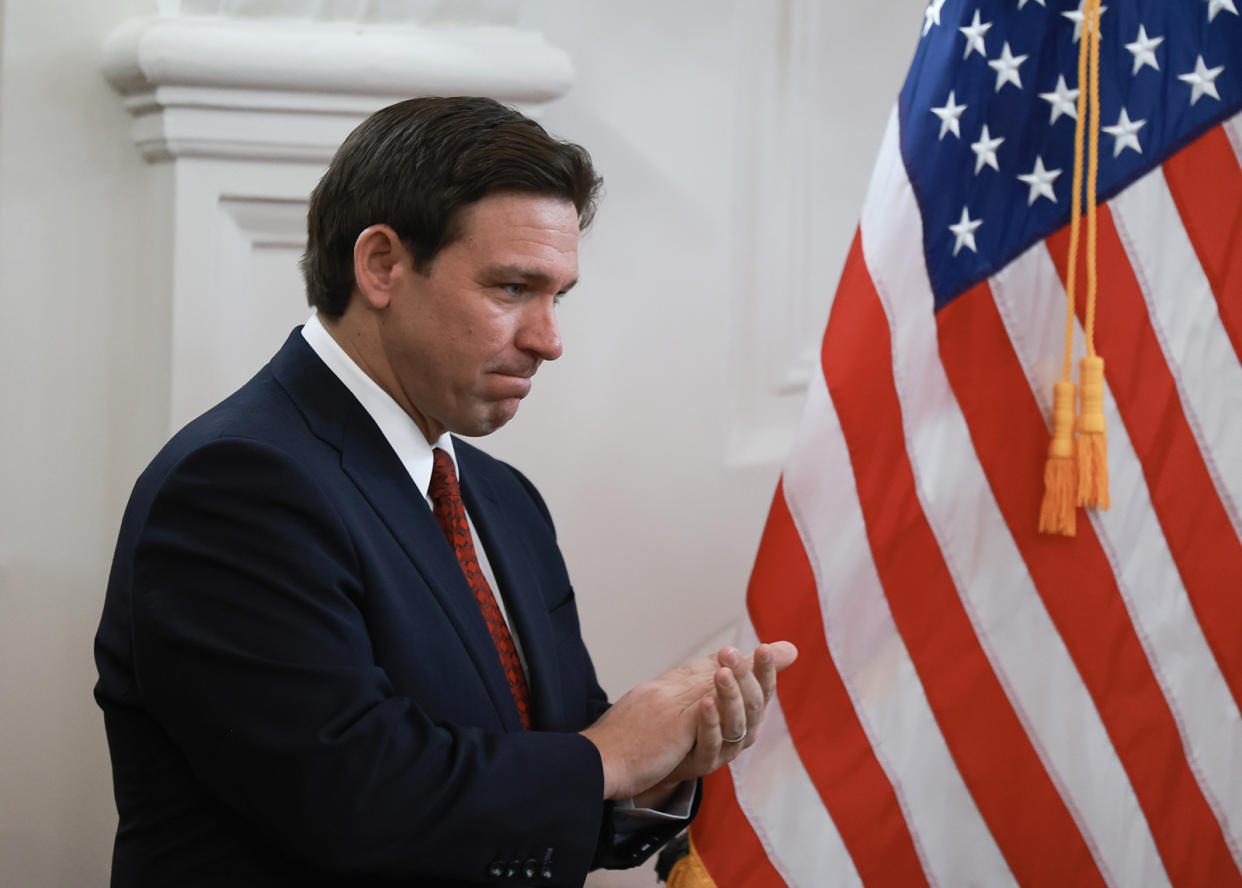‘Fetal personhood’ raises questions about abortion rights in Florida

- Oops!Something went wrong.Please try again later.
“Fetal personhood” is emerging as a battleground in Florida’s abortion debate, posing a potential roadblock to those who want to guarantee access to the procedure in the post-Roe era through the ballot box.
The legal question of when personhood is established could have far-reaching implications for abortion access and in-vitro fertilization, said Bob Jarvis, a law professor at Nova Southeastern University in South Florida.
“The practical effect of granting personhood to fetuses is that abortion will become completely illegal and any attempt to kill a fetus, or even a frozen embryo, would be an act of homicide,” he said.
A ruling by the Alabama Supreme Court that frozen embryos are children has put a spotlight on the fetal personhood movement. Proponents have argued for decades that personhood is established at conception with a fertilized egg having the legal and moral rights of a child.
Florida is poised to ban most abortions after six weeks of pregnancy, provided the Florida Supreme Court upholds a 15-week ban passed by state lawmakers in 2022. But voters could get a say in the November election on whether to protect abortion access “before viability or when necessary to protect the patient’s health, as determined by the patient’s healthcare provider,” blocking the abortion bans.
Legal observers say Alabama’s ruling could boost efforts in Florida to establish fetal personhood, a debate happening nationally with the U.S. Supreme Court’s overturning of Roe v. Wade.
“It seems as if things are headed that way in Florida,” said Mary Ziegler, a UC Davis law professor who studies the legal history of abortion in America. “It seems as long as the Florida Supreme Court is constituted the way it is now we are headed for a collision with that question sooner or later.”
Florida Supreme Court Chief Justice Carlos Muñiz pondered in Feb. 7 arguments whether a fetus would be protected under a provision in Florida’s constitution guaranteeing the right to life to “all natural persons.”
Florida’s Supreme Court has moved to the right with Republican Gov. Ron DeSantis appointing five of the seven justices.
If Florida’s high court established fetal personhood, it could conceivably invalidate any voter-approved amendment protecting abortion rights and open a “Pandora’s box” of legal questions, Ziegler said. Followed to its logical conclusions, fetal personhood could raise questions spanning from whether fetuses should be counted in a census to whether child support should begin at conception, she said.
The anti-abortion Liberty Counsel argues that Florida law already establishes rights for an “unborn child” in criminal, civil, tort, guardianship, trust and estate law, starting at conception. The religious liberty organization filed a brief with the Florida Supreme Court in response to Muñiz’s comments, arguing that an abortion rights amendment should be blocked because it doesn’t make voters aware of those existing rights.
“The Florida Legislature has routinely recognized an unborn child having legal rights in all these areas,” said Mat Staver, the group’s founder and chairman.
For instance, Florida law provides criminal penalties if someone injures or kills an “unborn child” under the Unborn Victims of Violence Act that became effective in 2014.
Most recently, Florida lawmakers are considering legislation (SB 476/ HB 651) that would allow parents to collect damages for the wrongful death of an “unborn child.” That bill uses the same definition for an “unborn child” as the existing criminal statute: “a member of the species Homo sapiens, at any stage of development, who is carried in the womb.”
Unlike the criminal statute, it does not include an explicit exception for abortion. The proposal specifies a woman cannot be sued for the death of her unborn child.
Some anti-abortion advocates want lawmakers to expand the definition of “unborn child” to include frozen embryos outside the womb. Critics argue that the bill would lead to a barrage of frivolous lawsuits, endanger Floridians access to abortion and fertility treatments and worsen a shortage of OB/GYNs. Supporters counter that expecting parents should be able to collect damages for pain and suffering if negligence results in the death of their unborn child.
Florida is one of six states that does do not recognize a cause of action for the wrongful death of an unborn child, according to a legislative analysis. While some states allow for a lawsuit at any stage of fetal development, others require a viability standard to be met.
In the 1973 case Roe v. Wade guaranteeing access to abortion, the U.S. Supreme Court concluded that word “person” as used in the 14th Amendment does not include the unborn. The Florida Supreme Court made a similar determination in 1978 that a fetus was not a “person” under the state’s wrongful death statute.
The Florida Supreme Court has until April 1 to decide whether voters will get a say on the abortion rights amendment in the November election.
The amendment’s supporters say the court shouldn’t block Floridians from getting to decide the issue. The amendment would need at least 60% of the vote to pass if it makes the ballot.
“It would be unprecedented for the Florida Supreme Court to block a proposed initiative for not asserting that a separate constitutional provision means something that the Court has never said it meant,” said Michelle Morton, research manager and policy counsel with the American Civil Liberties Union of Florida. “To the contrary, it would be improper — indeed impossible — to include for voters a guess about how other constitutional provisions might be interpreted at some future time in some future litigation.”
___

